Book contents
- Frontmatter
- Contents
- Figures
- Tables
- Acknowledgments
- Introduction
- 1 Government: Boss, financial partner, regulator – Entrepreneurs in mixed economies
- 2 Standing still is not an option: On promoting entrepreneurship and economic growth
- 3 Electronic innovation and the government: David Sarnoff creates the RCA empire
- 4 Global problem, golden opportunity: Ron Stanton profits from market disruption
- 5 Speeding voice and data traffic worldwide: Network microprocessors from RMI
- 6 A world leader emerges: SanDisk and flash memories
- 7 Implementing information technology across the globe
- 8 Three startups in China: Entrepreneurs in a controlled economy
- 9 Connecting the wireless networks of the world
- 10 Building an economy: Government planning vs. entrepreneurial innovation
- Select bibliography
- Index
- References
10 - Building an economy: Government planning vs. entrepreneurial innovation
Published online by Cambridge University Press: 05 August 2012
- Frontmatter
- Contents
- Figures
- Tables
- Acknowledgments
- Introduction
- 1 Government: Boss, financial partner, regulator – Entrepreneurs in mixed economies
- 2 Standing still is not an option: On promoting entrepreneurship and economic growth
- 3 Electronic innovation and the government: David Sarnoff creates the RCA empire
- 4 Global problem, golden opportunity: Ron Stanton profits from market disruption
- 5 Speeding voice and data traffic worldwide: Network microprocessors from RMI
- 6 A world leader emerges: SanDisk and flash memories
- 7 Implementing information technology across the globe
- 8 Three startups in China: Entrepreneurs in a controlled economy
- 9 Connecting the wireless networks of the world
- 10 Building an economy: Government planning vs. entrepreneurial innovation
- Select bibliography
- Index
- References
Summary
“Reconquer the domestic market!” is a rallying cry invented by the government in its effort to reduce France’s foreign trade deficit and stimulate citizens to buy nationally-made products in preference to imports.
While globalization has opened up markets everywhere, it has also thrown the inherent tension between government economic activism and entrepreneurial freedom into sharp relief. We now take up crucial questions about the proper role of government on the one hand, and the place, indeed the very future, of entrepreneurship on the other.
In our global economy entrepreneurs are frequently competing with companies supported and directed, and often controlled, by the governments of the countries where they do business. It is hardly an even match: such policies inevitably engender hidden or overt preferences for buying local products.
Clearly, state-controlled economies pose a serious challenge to the basic concept of entrepreneurship and the ability of foreign corporations to operate freely within those economies. By raising barriers to international sales opportunities, they clearly increase the inherent risks of launching new entrepreneurial businesses. Under such conditions, it is fair to ask whether the individualistic and “random” entrepreneurial process, gated by so many unpredictable circumstances, can be counted upon in the future as a signii - cant economic driver. Must governments everywhere become much more involved in supporting ambitious entrepreneurs focused on creating new markets? This is a pressing issue for countries like the US, which have a tradition of free markets and limited government support of their industries.
- Type
- Chapter
- Information
- Entrepreneurship in the Global EconomyEngine for Economic Growth, pp. 227 - 256Publisher: Cambridge University PressPrint publication year: 2012



